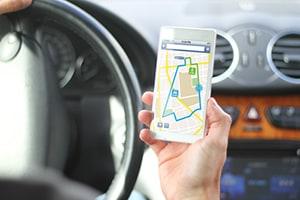Claims Against Uber and Lyft

App based Ride sharing services have grown to be a common means of transportation, particularly in urban areas like Seattle and the surrounding communities. Services like Uber and Lyft allow drivers to charge for rides in their personal vehicles. Some drivers use ride sharing apps full time as their primary source of income, and others drive part time to earn extra cash on top of other employment.
With the increased prevalence of Uber, Lyft, and other ride sharing apps, there has been an increase in motor vehicle crashes involving vehicles for hire.
In most cases, car crash claims are brought directly against the driver who caused the crash and no one else. Auto insurance generally pays for the damages caused by the crash, but the claim is technically brought against the driver and not the insurance company. When a person is using their vehicle for business purposes, such as while driving for Uber or Lyft, there is likely a claim against both the driver and the business entity.
You may know that Washington law requires everyone on the road to have certain minimum auto insurance coverage, but you might not know that most auto insurance policies are written so that drivers are not protected while using their vehicle for business purposes, including while driving for hire. That means that while an Uber or Lyft driver is carrying passengers for hire (and in some other limited situations), their personal auto insurance policy doesn’t apply. Instead, the driver is covered by the ride share company’s business policy. (To learn more about Washington’s insurance requirements, click here)
Below are some typical situations where an injured person may have a right to bring a claim against Uber or Lyft:
- Passenger in an Uber or Lyft vehicle injured in a crash caused by an Uber or Lyft driver’s negligence
- Occupant of another vehicle injured in a crash caused by an Uber or Lyft driver’s negligence
- Pedestrian or cyclist hit by an Uber or Lyft driver (click here to learn more about pedestrian injury cases, and here to learn more about cycling accidents)
In addition to liability situations like those discussed above, you may have rights under Uber or Lyft’s insurance policies even if the crash was not caused by a ride share driver. Some examples include:
- Passenger in an Uber or Lyft vehicle hurt in a crash caused by another vehicle on the road
- Uber or Lyft driver injured in a crash caused by another vehicle
- Pedestrian hit by Uber or Lyft drivers
Occupants of Uber and Lyft vehicles are likely covered by the company’s underinsured motorist (UIM) motorist coverage. That means that if you are an Uber or Lyft driver, or a passenger in an Uber or Lyft vehicle, and you are injured in a crash caused by another driver, there is probably insurance coverage to protect you in the event that other driver does not have insurance or has insufficient insurance to adequately compensate you. (To learn more about UIM coverage, click here)
In addition, occupants of Uber and Lyft vehicles and any pedestrian hit by a ride share vehicle may have rights to personal injury protection (PIP) coverage for medical bills resulting from a crash. PIP coverage is not dependant on fault, meaning that it applies even if the crash is not the fault of the ride share driver. (To learn more about PIP coverage, click here)
If you have been injured in a crash involving a ride share vehicle in any way, there are unique considerations that should be taken into account in the handling of your claim. To ensure that your claim is properly handled, consult with an experienced accident injury lawyer. Call our firm today at 206.624.8844 for a free case evaluation.







